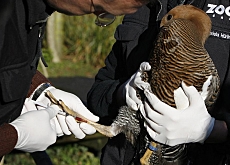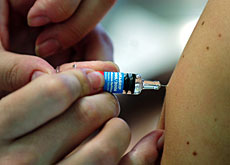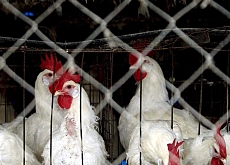Zoo bird flu vaccinations considered success

Researchers say a trial of preventive avian flu vaccinations for birds at a number of Swiss zoos last year was reasonably successful.
The tests, authorised by the Federal Veterinary Office, showed that most of the animals had supported the treatment well and many of them had built up resistance to the influenza virus.
The vaccination campaign was launched after the deadly HN51 virus made it to the shores of the Black Sea in autumn 2005. The zoos in Basel, Zurich, Bern and Goldau put in a request to immunise their birds.
The veterinary office does not normally permit vaccinating birds. It says that chickens for example that have been given a shot might not get sick, but could still pass on the virus unnoticed and cause far more damage.
However, the specific situation of the zoos was taken into account. Many of their birds are both valuable and rare, if not endangered in the wild, and normally don’t come into contact with domestic fowl.
As the vaccine for the flu had not been tested on exotic birds, the vaccination campaign was given the go-ahead as part of a research project.
“This was not a test for vaccinating poultry in Switzerland but a scientific project to know about vaccinating exotic birds. The results are known in chickens – vaccinations protect against diseases but not against infection,” Marcel Falk of the Federal Veterinary Office told swissinfo.
“Switzerland is free of bird flu and we want to remain that way, which is why we do not use vaccinate poultry. A bird could still get infected and would show no symptoms [if vaccinated], so it could be sold on without the farmer knowing it has bird flu.
“We have many valuable and rare birds housed in zoos so it is important to know how they react to vaccinations.”
Antibodies
Zurich University specialists oversaw the immunisation of the zoo animals, which was carried out twice, with a five-week interval, at the end of 2005. The effects of the vaccination were checked with blood tests after ten and 26 weeks.
The tests showed that more than 80 per cent of the birds had amounts of antibodies to the virus in their bloodstream similar to that considered necessary in a chicken to ward off disease.
But the researchers could not say if this would be enough to protect the zoo birds.
The amount of antibodies present also fell fairly quickly. In penguins and owls, it was undetectable after 26 weeks, meaning vaccinations would have to be carried out every year.
The animals withstood the effects of the vaccination fairly well. None of the birds displayed significant negative reactions.
Out of a total of more than 1,000 jabs for vaccinations and blood tests, only two birds died during the trial, while another managed to escape.
The study is set to continue, with antibody measurement planned after 12 months.
Switzerland is not the only country to have carried out such tests. Hundreds of zoos across Europe followed the same path in the past year.
swissinfo with agencies
The idea for the vaccine tests on exotic birds was first mooted at the end of October last year.
The first vaccination took place on December 14, 2005.
Some 365 birds of 11 different varieties – including pelicans, penguins, owls and falcons – were submitted to the test.
Avian influenza is an infectious disease of birds caused by type A strains of the influenza virus. The disease occurs worldwide. While all birds are thought to be susceptible to infection with avian influenza viruses, many wild bird species carry these viruses with no apparent signs of harm.
Other bird species, including domestic poultry, develop disease when infected with avian influenza viruses. In poultry, the viruses cause two distinctly different forms of disease – one common and mild, the other rare and highly lethal.
In 2005, the international spread of the deadly H5N1 virus in birds became apparent for the first time.
Scientists are increasingly convinced that at least some migratory waterfowl are now carrying the virus, sometimes over long distances, and introducing it to poultry flocks in areas that lie along their migratory routes.
Only 24 outbreaks of highly pathogenic avian influenza have been recorded worldwide since 1959.

In compliance with the JTI standards
More: SWI swissinfo.ch certified by the Journalism Trust Initiative



You can find an overview of ongoing debates with our journalists here. Please join us!
If you want to start a conversation about a topic raised in this article or want to report factual errors, email us at english@swissinfo.ch.